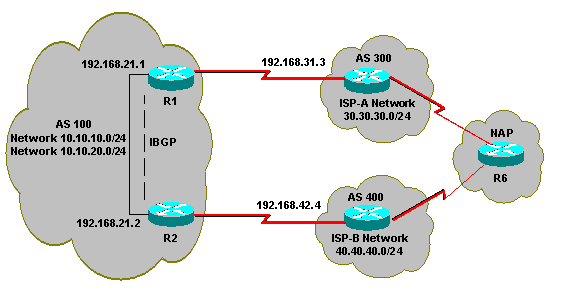- Cisco Community
- Technology and Support
- Networking
- Routing
- Hi Vinit,Thank you for your
- Subscribe to RSS Feed
- Mark Topic as New
- Mark Topic as Read
- Float this Topic for Current User
- Bookmark
- Subscribe
- Mute
- Printer Friendly Page
- Mark as New
- Bookmark
- Subscribe
- Mute
- Subscribe to RSS Feed
- Permalink
- Report Inappropriate Content
09-11-2015 08:26 AM - edited 03-05-2019 02:16 AM
Consider a typical multihoming scenario where two separate routers have eBGP connections to different autonomous systems taking full routes just like below:

If I was to run iBGP between the routers to take advantage of attributes such as Local Preference, would each router, for example R1 and R2, have to hold two copies of the routing table learned from both ISP-A and ISP-B respectively. Or does each router only hold the one routing table obtained from its eBGP peer and compare routes some other way?
Thank you for taking the time to read and answer this question.
Solved! Go to Solution.
- Labels:
-
Other Routing
Accepted Solutions
- Mark as New
- Bookmark
- Subscribe
- Mute
- Subscribe to RSS Feed
- Permalink
- Report Inappropriate Content
09-12-2015 07:28 AM
Yes, that is correct. You can simple try this out in GNS3 or VIRL by having a 4 router topology and advertising just the loopback of the AS300 and AS400 router..
--Vinit
- Mark as New
- Bookmark
- Subscribe
- Mute
- Subscribe to RSS Feed
- Permalink
- Report Inappropriate Content
09-11-2015 10:22 AM
Hello,
Both R1 and R2 will hold the prefixes from both the ISP. If its the same prefix learnt from both ISP's, then yes, two paths for same prefix. Though, you can limit the advertisement of prefixes using a route-map to each other and you can also make each router preferred for respective prefixes by setting the local-pref high for the prefixes matching the route-map.
Hope this helps.
Vinit
--Vinit
- Mark as New
- Bookmark
- Subscribe
- Mute
- Subscribe to RSS Feed
- Permalink
- Report Inappropriate Content
09-12-2015 06:40 AM
Hi Vinit,
Thank you for your reply.
To clarify you are saying R1 and R2 will hold a copy of each other's routing table (as well as their own) as learn by their respective eBGP peers? So in other words the memory on the router will be consumed by twice the amount, for example if full tables were taken from both providers, so x2 full tables on each router?
- Mark as New
- Bookmark
- Subscribe
- Mute
- Subscribe to RSS Feed
- Permalink
- Report Inappropriate Content
09-12-2015 07:28 AM
Yes, that is correct. You can simple try this out in GNS3 or VIRL by having a 4 router topology and advertising just the loopback of the AS300 and AS400 router..
--Vinit
- Mark as New
- Bookmark
- Subscribe
- Mute
- Subscribe to RSS Feed
- Permalink
- Report Inappropriate Content
09-12-2015 02:00 PM
Hi alistair,
you could also have just one in the following scenario: suppose that R4 determines that path through AS-100 its better then through R6, in this case R2 will have just R1 copy of the BGP table (in this case router in ISP-B has two copy). In a very simple network topology, like the one in your diagram, is impossible without modifying BGP PA in same way (for example making prepend) but in real network you can't know how ISP are connect, if and how they modify BGP attributes and therefore could happen. This is not very usual but be careful because, in that case, you could became a transit AS (at least if ISP doesn't configure BGP to avoid this situation).
Bye,
enrico
Find answers to your questions by entering keywords or phrases in the Search bar above. New here? Use these resources to familiarize yourself with the community:

